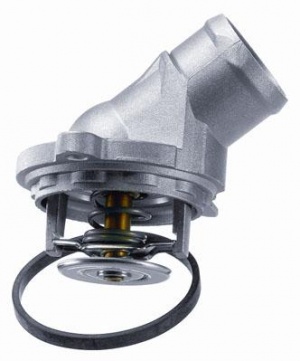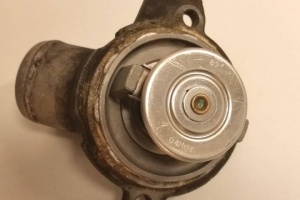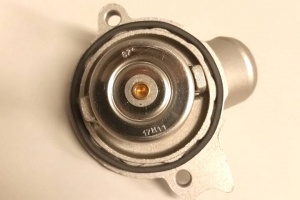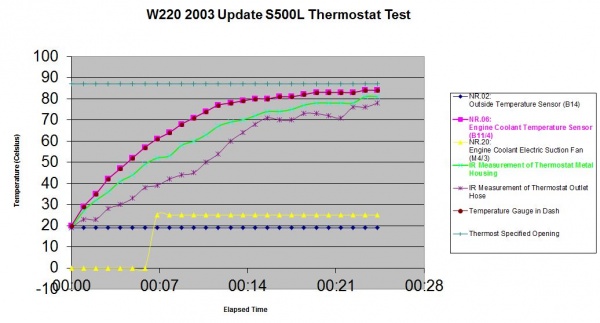WIS 20.10 Coolant Pump, Coolant Thermostat: Difference between revisions
No edit summary |
(→DIY Procedures - Coolant Pump: fix youtube) |
||
| Line 97: | Line 97: | ||
{| | {| | ||
|{{#ev:youtube|https://www.youtube.com/watch?v=fSfg5fpCiSk | |{{#ev:youtube|https://www.youtube.com/watch?v=fSfg5fpCiSk|320|center|Coolant Pump Replacement (By Masood)|frame}} | ||
|} | |} | ||
Revision as of 20:53, 18 November 2019
Back to Index
Description - WIS 20.10 Coolant Pump, Tank, Thermostat, Flush
The performance and emission control of a sophisticated vehicle engine such as found in a M-B is very dependent on accurate and fast temperature control and to achieve this the performance of the thermostat is a critical.
A thermostat in good working order should allow the engine to warm up from cold very quickly and then maintains the specified temperature of the engine and the coolant within narrow limits by increasing and decreasing the coolant flow by opening and closing.
The W220 thermostat works in conjunction with the vehicle's electronically controlled cooling fan.
Comparison Coolant Temperature with Old and New Thermostats

Unfortunately, issues with engine cooling are most difficult to troubleshoot without proper equipment and knowledge. It's even more difficult in M-B vehicles which have computers that continuously adjust timing, idle speed, vacuum and fuel delivery automatically to make up for potentially faulty temperature sensor signals.
Proper modern vehicle engine cooling is very dependent of the performance of:
- Coolant fluid,
- Cooling pump,
- Cooling fan,
- Cooling system hoses and clamps,
- Belt drives,
- Radiator,
- Coolant thermostat,
- Electronic Control Modules and
- Temperature sensors.
Proper maintenance of your cooling system is best achieved by:
- Keeping the radiator cooling fins and grill clean and free from dirt and blockages.
- Keeping the engine clean.
- Keeping temperature sensors clean and connectors free of corrosion.
- Regularly changing the radiator fluid with specified coolant.
- Checking and replacing any associated cooling hoses or parts at the factory-specified time or mileage limits.
- Subjectively monitoring the cooling system performance by regularly noting the temperature gauge reading.
- Objectively measuring the performance of the thermostat.
The thermostat is a spring-loaded valve that opens and closes based on the temperature of the coolant flowing through it.
The thermostat is meant to maintain the engine at a constant specified temperature. However, many other conditions may cause the coolant to over heat or be too cold, or appear to be over heating or too cool, so you need to investigate each possibility before condemning the thermostat.
As well as the thermostat investigate the performance of:
- Blocked or leaky radiator.
- Radiator pressure cap.
- Lack of coolant.
- Air trapped in the cooling system.
- Water pump.
- Belt drive to water pump.
- Fan clutch if fitted.
- Electric cooling fan motor, relay, wiring, connectors or fuse.
- Auxiliary cooling fan.
- Cooling system hoses and fittings.
- Temperature gauge, or sender.
- Warning light sender.
- Thermo-time switch or cold start valve control.
Issues - Coolant Thermostat
- New thermostats only seem to last about 5 years and then start malfunctioning.
- Thermostats commonly get fatigued with time and no longer maintain the engine at the correct operating temperature.
- A fatigued thermostat also takes much longer for the vehicle to warm up from cold resulting in unnecessary engine wear and excessive fuel consumption.
- A high temperature reading followed by a drop to normal temperature is a common first sign of a sticking thermostat.
- Thermostats often remain permanently stuck open.
- Some thermostats remain stuck closed, evidenced by an overheating engine.
Solutions - Coolant Thermostat
- Replace a faulty thermostat with the a new one with the specified temperature setting.
- Do not substitute the specified thermostat under any circumstances. The electronics in your vehicle may use the original temperature setting for other controls such as electronic fan control and fuel delivery.
- Check belts and hoses whenever you're working on any coolant system components.
Part Number - Coolant Thermostat
The M113 960 engine coolant thermostat specified opening temperature is 87°C.
- OE A1122030275 (Replaces A1122000015) ~ 30 EUR.
- OEM WAHLER 4281.87D ~ 15 EUR.
 |
  |
Diagnosis - Coolant Thermostat
- The M-B in-dash temperature gauge is often the best guide to the performance of the cooling system and the thermostat function.
- The STAR Diagnostic System is a valuable tool for diagnosing coolant system issues.
- Code Readers can easily read out Diagnostic Trouble Codes (DTC).
- Diagnosis by objectively measuring the performance of the thermostat is now an easy task with smart phones and wireless diagnostic OBDII sensors.
- The value of the coolant temperature may be monitored via the Automatic Climate Control (ACC) Service Menus Parameter NR.06: Engine Coolant Temperature Sensor (B11/4).
Example ACC Hidden Menu and IR Thermometer readings for W220 with a faulty thermostat.
Notes:
- The rotation of the Engine Coolant Electric Suction Fan (M4/3) was monitored visually.
- The In-dash gauge and ACC Parameter NR.06: agreed perfectly.
- The faulty thermostat never reached the specified operating temperature resulting in noticeably excessive fuel consumption.
- The measurements using an IR Thermometer to monitor the radiator output hose and the thermostat metal housing were haphazard but a useful guide.

DIY Procedures - Coolant Pump
DIY - Replace Coolant Pump
DIY Procedures - Coolant Tank
DIY - Replace Coolant Tank
DIY Procedures - Coolant Flush
DIY - Flush Coolant Completely
DIY Procedures - Coolant Thermostat
DIY Measurements - Coolant Thermostat
Version 01 posted 2012-04-27: http://www.benzworld.org/forums/w220-s-class/1649584-s500-new-thermostat-compared-original.html
DIY Replace - Coolant Thermostat
http://www.benzworld.org/forums/w220-s-class/2296553-v12tt-water-pump-diy.html